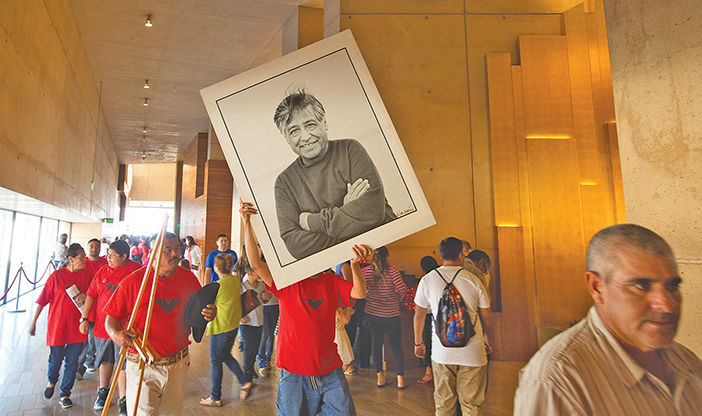On April 19, the memory of a California farmworker drew thousands to the Cathedral of Our Lady of the Angels to celebrate his fight for justice against oppressive farm contractors and the politicians who legislated in their favor.
A friend of Senator Bobby Kennedy, a follower of Martin Luther King, Jr. and a Catholic on fire to cure ingrained social ills, César Chávez died in 1993 after spending a lifetime forming labor unions and leading civil rights campaigns to protect migrant workers.
Archbishop José H. Gomez celebrated Sunday’s César E. Chávez Memorial Mass, which marked the 22nd anniversary of Chávez’s passing. Chavez’s son Paul and United Farm Workers (UFW) president Arturo Rodriguez were in attendance. The UFW was founded in 1966 and is still active today. In the 1970s, the union represented 50,000 farmhands.
During the early to mid-20th century, Mexican-American farmworkers faced countless abuses. Their children were malnourished and forced into child labor with little pay. The average life expectancy of farmhands was estimated at 20 years less than the U.S. average.
The inhuman living conditions, inferior schools — if there were any schools — and sexual harassment of female workers went unreported and unnoticed by the authorities.
Chávez’s philosophy was simple and effective: A mistreated person needs to stand up for himself with peaceful and unflinching opposition. He learned this from his mother, Juana, who was always first to join the farmhands in their strikes.
The Chávez family worked long hours and could barely get by, but no matter the cost, she believed in asserting one’s human dignity.
Chávez recalled during his mother’s eulogy that once, Juana noticed a contractor using his knee to push the scale up while weighing the day’s pickings. The worker’s view was blocked from seeing that the 100-pound sack registered as 80 pounds.
His mother called the contractor out, notifying the rest of the workers. The enraged contractor immediately fired the entire Chavez family, but Chavez said that his mother was unfazed. She said that there was a difference between “being of service and being a servant.”
Juana also taught her six children to help the impoverished. Even during the Great Depression, when the Chávez family lived in a tent, Juana would send Chávez and his brother Richard to the railroad yards to bring the “hobos” back for a meal.
His mother would tell the family, “You always have to help the needy, and God will help you.”
Chávez said of his mother, “When she wasn’t helping people or getting us fired for challenging labor contractors, we were the ‘strikingest’ family in all of the farm labor.”
During the Mass, Archbishop Gomez said that Chávez had a deep devotion to Our Lady of Guadalupe and lived the Beatitudes. “He fought for justice for his people — using the spiritual weapons of prayer, fasting and self-sacrifice. And he always urged nonviolence.”
The archbishop added that Chávez’s mission was of premier importance, saying, “Justice for immigrants is one of the great human rights issues of our time.”
Catholic social teachings had a great influence on Chávez. Father Donald McDonnell, a parish priest from San Jose, taught the budding activist about Gandhi and St. Francis. Chávez and the priest also discussed the papal encyclicals on social justice, which dealt with workers’ rights and the benefits of labor unions.
In the 1891 encyclical Rerum Novarum (“The Revolutionary Change”), Pope Leo XIII wrote, “working men have been surrendered, isolated and helpless, to the hard-heartedness of employers and the greed of unchecked competition.”
The pope urged workers to form unions in order to ensure proper pay and better working conditions. Pope Leo wrote that he “greatly desired that they [unions] should become more numerous and more efficient.”
Chávez worked to create revolution that the papal encyclical entreated. However, the fight is far from finished.
Some of those attending the memorial Mass work at Gerawan Farming, a company that has yet to agree to a union contract — leaving 5,000 workers vulnerable to unfair treatment. The state approved the contract in 2013. Years later, the fight continues.

